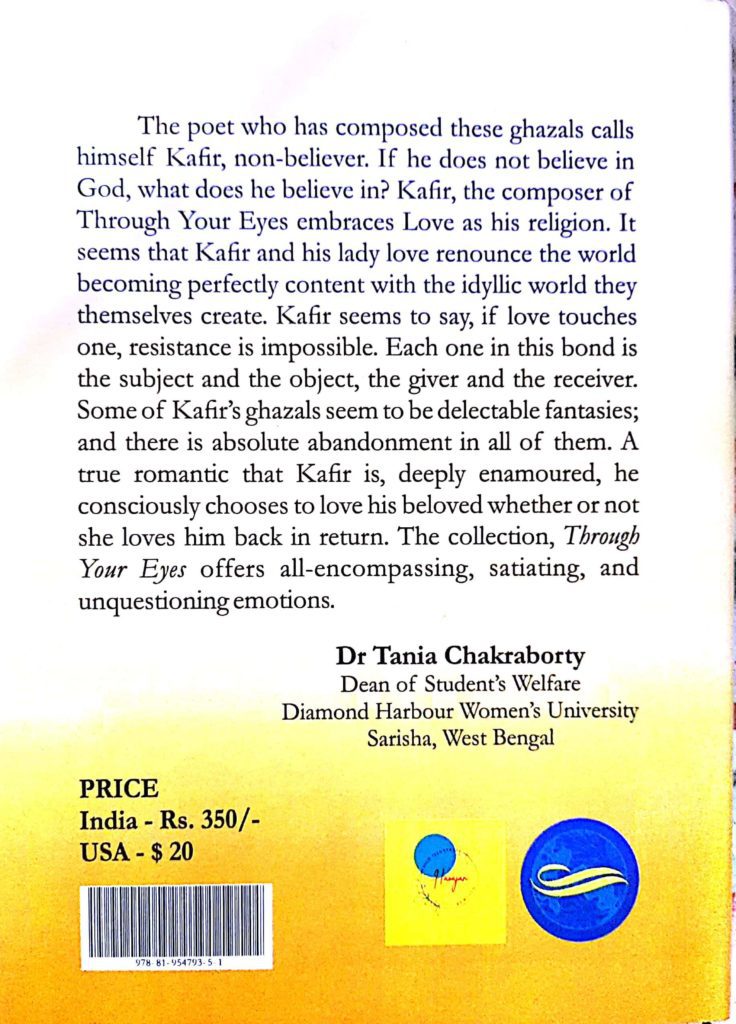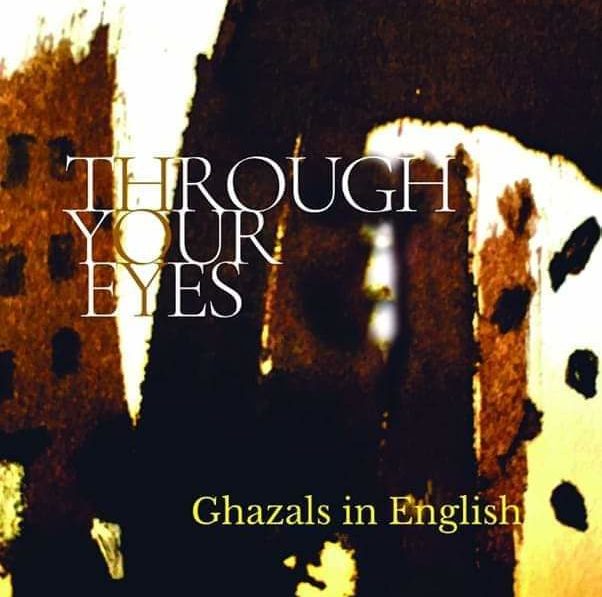Gopal reviews, A Collection of Ghazals in English, by Rajorshi Patranabis, exclusively for Different Truths.

Poetry, especially ghazal, is indeed the language of the soul, sweet and joyful, sometimes sad, and sorrowful. Ghazal is a unique poetic form that had its origins in Arabia. Through the Persian language it travelled to India and captivated the hearts of poetry lovers in the form of Urdu Ghazal. Its inventive lyricism highlights the intersectional nature of poetry with music, cadence and mystic elements of life.
Rajorshi Patranabis aka Kafir, a gifted poet, in his latest collection of ghazals in English, ‘Through Your Eyes’ fills words with deeper emotion, shade and wide meanings in his poetic landscape.
…Ayaz Rasool Nazki … has rightly mentioned, ‘Poetry is the art of discovery and good poetry discovers a song hidden under the pebbles in a dry stream….’
In his Foreword, Ayaz Rasool Nazki, an eminent poet and novelist from Kashmir, has rightly mentioned, ‘Poetry is the art of discovery and good poetry discovers a song hidden under the pebbles in a dry stream. Moon and stars, leaf and the butterfly, all carry stories and Rajorshi is on a voyage across the horizons, oceans and deserts. He brings the fragments of those stories and skilfully weaves them into the gazal, that ‘half-wild ‘genre of fragmented thoughts.’
Background
We all know that the structure of Urdu ghazal is very typical and the couplets in general represent a two-line poem which is complete in every sense with a common meter-rhyme-refrain format. Mirza Ghalib’s Urdu ghazal or Agha Shahi’s ghazals written in English are exemplary. Urdu is a flowery language and its poetry is laced with hyperboles whereas English is comparatively sedate. So, a lot of creation is involved in writing ghazals in English.
Though the main leitmotifs of the ghazal in early times were divine love, worldly love and beauty, with its journey through many nations and cultures, its canvas is ever expanding. And now it also includes the various aspects of human life, nature and philosophy.
The perception of love reflected in Urdu ghazal outdoes romantic or physical love…
The perception of love reflected in Urdu ghazal outdoes romantic or physical love and is mostly about selfless or unreciprocated love, bordering on the mystic. Sufism has been a strong influence on Urdu ghazals, and divine love is the main theme of Sufi ghazals, while other ghazals talk about worldly love and other aspects of life.
Fragmented Thoughts and Encompassing Love
Ayaz Rasool Nazki has also talked about the history of ghazal, ‘What did not change through its long history remains what we call as ‘reza khayali’ or fragmentizing of the thought’.
It is said that ghazals are like rivers within boundaries rather than the turbulent seas. Rajorshi’s sixty ghazals in this collection are not always strict to the rigid format, challenging the status quo thinking. His ghazals always hum with fragmented thoughts and human warmth. But never speak of any person in particular. The beautiful illustrations that go with some of these ghazals, have added value to the book.
Here is a poet who can create a ghazal of wonderful liberating power.
Here is a poet who can create a ghazal of wonderful liberating power. His poems are like whispering to one’s self and listening at the same time. There are no boundaries and that’s what his ghazals are all about. Moreover, his ghazals are as if a journey through endless scenes of love, desire, mysticism and grief, transformed in a poetic form.
Deep inside you shade me Buried in heaven my death dies Let me drink through your eyes Kafir and his lusty vice Let me drink through your eyes (Through Your Eyes)
And sometimes his ghazals are truly a heartfelt cry for the soul.
The poet in his introductory note has explained, ‘I am a Kafir who pens down with his blood – Blood that had oozed out of his heart’. And sometimes his ghazals are truly a heartfelt cry for the soul. We are reminded that the value of the poem depends upon the justness or appropriateness of the poet’s emotional response.
Kafir toils to weigh my heart Every drop that spews your blood Diamond studded green in jade How do I colour my love in red? Winter chills frost me dead How do I colour my love in red? (Red)
Intimate Voice and Honest Admission
Some of his ghazals instantly offer upfront presence: an intimate voice making honest admissions. It’s a collection that extends hands and heart to a reader — no abstraction or obscure shadings. The poet prefers his imagery poised and purposeful.
Celebrated each of your spike Naive heart’s unknown aplomb Became a slave in my fiefdom. Roses bloomed in every flower Your ecstasy, my winsome Became a slave in my fiefdom. (Fiefdom)
The poet bridges time, loss and space with a tone that is consistently appealing and alluring.

Professor Tania Chakraborty, has noted in her blurb, ‘Some of Kafir’s ghazals seem to be delectable fantasies and there is absolute abandonment in all of them.’ The poet bridges time, loss and space with a tone that is consistently appealing and alluring. His ghazals transfigure the impressions of grief into something uplifting and wondrous.
Remember taking my breath My touch, in my death. Felt your arms Smelt your lips Last kiss, I eternally wait. My presence, in my death’. (In my death)
We know poetry for the most part is resonant. That’s one aspect that makes the written word so grand. In most of his ghazals, there is a sense of glorious wordplay – sounds as soulmates.
We also understand that poetry can cross many borders, cultures and barriers.
We also understand that poetry can cross many borders, cultures and barriers. And capture the essence of life to the fullest. The poet’s visionary gaze always questions the philosophy of life. Here the poet’s search for answers is palpable,
Kafir defines love Boundless hegemonic rebellion Monsoons break open your breathless fence Our poetry completes, our incomplete sentence. (Incomplete Sentence)
Exploration and Harmony
What a joy it is to see such a profound exploration of inner undulations, its traumas and its ecstasies throbbing in harmony in the following ghazal. These beautiful lines are cathartic in a way a few epilogues can achieve. The poet’s consciousness of the surroundings counts for a great deal.
Mounds of clay take your shape Warmth of you, I drape. Morose blooms laugh Happy roses weep I paint your eyes in frills and crepe Warmth of you, I drape. (Drape)
Emotive Crest and Magical Ending

Rajorshi’s ghazals resemble an emotive crest, forcefully at times, merging informal and surreal elements. Sometimes the rhymes are edgy and tempered by a mood of ubiquitous oddness. Yet he explores how meaning can be inserted into the much-used word and how it moves on the pages. His poems start working on simple thoughts that turn something almost magical at the end.
The beautiful lines, while retaining their rhythms, move towards modernity…
The beautiful lines, while retaining their rhythms, move towards modernity with their psychological probing of the soul. They espouse an aesthetic of stretch and outplay, beckoning free-flowing visions of splendour and anguish.
Nibbles of your voice Closets of thought Frames spread far Named you my lonely star. Held through ages Lips caressed your heart Rebirths still flaunt that scar Named you my lonely star (Lonely Star)
Or
Pink slivers its delightful might Live on, a glimpse of your sight. Kafir’s silent wish Smell your arrogance Toxics of metamorphosis Spiced vibrant aroma. Red heart emanates blued light Live on, a glimpse of your sight (Glimpse)
Deep Images
Strikes an airy tone, confiding yet remote, the poet draws images that deepen the force of the texts. This compels readers to stop and reflect. It is one of those books that speak directly to your instinctive feeling. There is something unclassifiable about the way the poet goes about his ghazals as if every line is a turning loose of emotion, a spontaneous outbreak. The book is both a repose to a deeply broken heart and an attempt to assuage it.
The cover design and the illustrations by Sarbajit Sarkar are a standout.
The cover design and the illustrations by Sarbajit Sarkar are a standout. This shimmering collection of ghazals written in English is a must for every ghazal lover.
Cover sourced by the reviewer





 By
By
 By
By
 By
By
 By
By
What a fantastic review of a beautiful book! Congratulations to both of you!